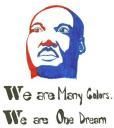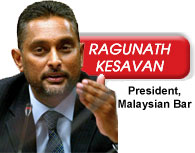Why Najib’s 1Malaysia will fail – Part 1
June 23, 2009

Let’s try to put a context to where Najib is coming from and headed to with his 1Malaysia.
What is Najib’s grand design that he now calls 1Malaysia?
Is his 1Malaysia novel and innovative, or re-hashed from a model that we’ve seen before?
Two days ago, Malaysianinsider reported Mukhriz as saying that it would be difficult to realise the “1Malaysia” concept if the Malays are not united, as the the Malays are the pillar in making 1 Malaysia a reality and played an important role in ensuring the country’s progress as they are the majority in the country.
I quote Mukhriz from that report :
“If they are not united, how are we going to realise the 1 Malaysia concept? This will not only be detrimental to the Malays but also to other races…When we talk about Malay unity, we are not talking from the racism point of view. We have accepted the fact that there cannot be a government which is led 100 per cent by Malay leaders … we have been practising power sharing for so long”
What do you discern from this?
One, ‘Malay unity talk’ ala UMNO-style is not racism.
Two, power sharing in the governance of this country is set, not on the premise of having the best men and women in place to get the job done, but along racial lines, with a predominance of Malays at the helm of government because they are the majority, because this is how power has been shared thus far.
If you want to know where Mukhriz is coming from, you don’t have to go far.
Just read his father’s ‘The Malay Dilemma’.
I’ve just finished re-reading that book.
If you’ve never read this book, you should make the effort to.
It’ll give you an idea of how this country found itself on that slippery slope into the cesspool we now are in when Mahathir took over the PMship.
It will reveal how this man, in the late 60’s / early 70’s, conveniently distorted a prevailing ‘have versus have-nots’ class issue into a racial one, portrayed as being that of the ‘marginalised Malays versus the non-Malay community’ and, through his years of rule as PM, perpetuated this thinking, with the acquiescence of the other BN component party leaders, of course.
In a speech that he was supposed to have delivered at the Harvard Club of Malaysia on 29th July 2002, this is what Mahathir is reported to have said :
“When I wrote The Malay Dilemma in the late 60s, I had assumed that all the Malays lacked the opportunities to develop and become successful. They lacked opportunities for educating themselves, opportunities to earn enough to go into business, opportunities to train in the required vocation, opportunities to obtain the necessary funding, licences and premises. If these opportunities could be made available to them, then they would succeed. …… So what is the new Malay dilemma? Their old dilemma was whether they should distort the picture a little in order to help themselves. The new dilemma is whether they should or should not do away with the crutches that they have got used to, which in fact they have become proud of. There is a minority of Malays who are confident enough to think of doing away with the crutches, albeit gradually. But they are a very small minority. Their numbers are not going to increase any time soon. They are generally regarded as traitors to the Malay race. ….”
There you have it!
Distort the picture in order to help themselves!
That the truth then was that every marginalised Malaysian, regardless of race,“lacked opportunities for educating themselves, opportunities to earn enough to go into business, opportunities to train in the required vocation, opportunities to obtain the necessary funding, licences and premises”, was buried in the distorted picture that was presented, so that certain quarters could help themselves.
11 years before that reported speech to the Havard Club, in 1991, Mahathir launched his Vision 2020 where he also spoke of establishing a united Malaysian nation; a Bangsa Malaysia, as he put it. I have alluded to this in a previous post last year. This is what Mahathir had said in 1991 of that Bangsa Malaysia :
“By the year 2020, Malaysia can be a united nation, with a confident Malaysian society, infused by strong moral and ethical values, living in a society that is democratic, liberal and tolerant, caring, economically just and equitable,progressive and prosperous, and in full possession of an economy that is competitive, dynamic, robust and resilient. There can be no fully developed Malaysia until we have finally overcome the nine central strategic challenges that have confronted us from the moment of our birth as an independent nation…The first of these is the challenges ofestablishing a united Malaysian nation with a sense of common and shared destiny. This must be a nation at peace with itself, territorially and ethnically integrated, living in harmony and full and fair partnership, made up of one ‘Bangsa Malaysia’ with political loyalty and dedication to the nation…The eighth is the challenge of ensuring an economically just society. This is a society in which there is a fair and equitable distribution of the wealth of the nation, in which there is full partnership in economic progress. Such a society cannot be in place so long as there is the identification of race with economic function, and the identification of economic backwardness with race.”
18 years on from that inspirational speech of his, why is it that we do not appear to be anywhere near establishing that one ‘Bangsa Malaysia’ with political loyalty and dedication to the nation ?
Was Mahathir’s Vision 2020 no different from his ‘Look East’ policy that he innovated soon after taking office, in that both were made up of inspiring rhetoric with little political will to carry through and which got us all sufficiently distracted so that the privileged hands that were raiding the national coffers could work at will and unnoticed?
What is the difference between Mahathir’s Vision 2020 and Najib’s 1Malaysia?
Is there such a difference between Mahathir and Najib that we should be encouraged to believe that, whilst Mahathiir had little impact in taking us anywhere near the Bangsa Malaysia he spoke of, with Najib, it will be otherwise ?





 The Malaysian Bar is alarmed and perturbed that the police continue to harass and intimidate lawyers by calling them in for questioning on matters relating to the execution of their professional duties.
The Malaysian Bar is alarmed and perturbed that the police continue to harass and intimidate lawyers by calling them in for questioning on matters relating to the execution of their professional duties.